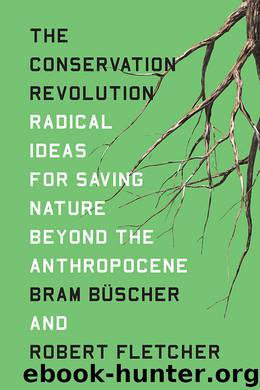The Conservation Revolution by Bram Buscher & Robert Fletcher

Author:Bram Buscher & Robert Fletcher
Language: eng
Format: epub
Publisher: Verso Books
RADICAL DIFFERENCES?
One crucial point about dealing with ‘radical differences’ is that in doing so, we are taken far beyond (already complex) differences between scientific traditions and disciplines. Perhaps, even more importantly, we arrive at different ways of understanding, seeing and knowing the world around us. This, in turn, leads to different visions for political action and how to understand, deal with and confront entrenched power – a point that we will come back to in the next chapter. Hence, underlying the three radical proposals – those of neoprotectionists, the new conservationists, and our convivial conservation proposal – are fundamental, radical differences on conceptual and other levels. And these radical differences are, to make matters even more complicated, based on and steeped in academic traditions and fields with their own radical differences.
Take our own main field of academic inquiry, that of political ecology, which has turned into a thriving field with many fundamentally different interests, ideas and political, social and academic viewpoints. How can we point towards so many different voices, opinions and ideas about the world and say that this will help us further? Yet, this is exactly the argument we want to make! We need to make explicit and be open about these differences, and debate them scientifically and politically. Or, phrased from a negative angle, by not acknowledging or accepting (fundamental or other) differences, one hides the politics associated with them – a strategy that is anti-political and a dynamic that is in itself a major interest of many political ecologists.48 The key, therefore, is to open up politics; to be open about politics, about differences of interest and power, and from there build a political platform which will allow us to move beyond these differences. So, how then do we deal with radical differences and on what basis can we move forward in building this platform? Our strategy is to render explicit the set of principles upon which we base our alternative of convivial conservation.
Download
This site does not store any files on its server. We only index and link to content provided by other sites. Please contact the content providers to delete copyright contents if any and email us, we'll remove relevant links or contents immediately.
The Secret History by Donna Tartt(18991)
The Social Justice Warrior Handbook by Lisa De Pasquale(12175)
Thirteen Reasons Why by Jay Asher(8869)
This Is How You Lose Her by Junot Diaz(6853)
Weapons of Math Destruction by Cathy O'Neil(6243)
Zero to One by Peter Thiel(5758)
Beartown by Fredrik Backman(5705)
The Myth of the Strong Leader by Archie Brown(5479)
The Fire Next Time by James Baldwin(5407)
How Democracies Die by Steven Levitsky & Daniel Ziblatt(5196)
Promise Me, Dad by Joe Biden(5127)
Stone's Rules by Roger Stone(5062)
A Higher Loyalty: Truth, Lies, and Leadership by James Comey(4937)
100 Deadly Skills by Clint Emerson(4898)
Rise and Kill First by Ronen Bergman(4754)
Secrecy World by Jake Bernstein(4722)
The David Icke Guide to the Global Conspiracy (and how to end it) by David Icke(4672)
The Farm by Tom Rob Smith(4483)
The Doomsday Machine by Daniel Ellsberg(4468)
